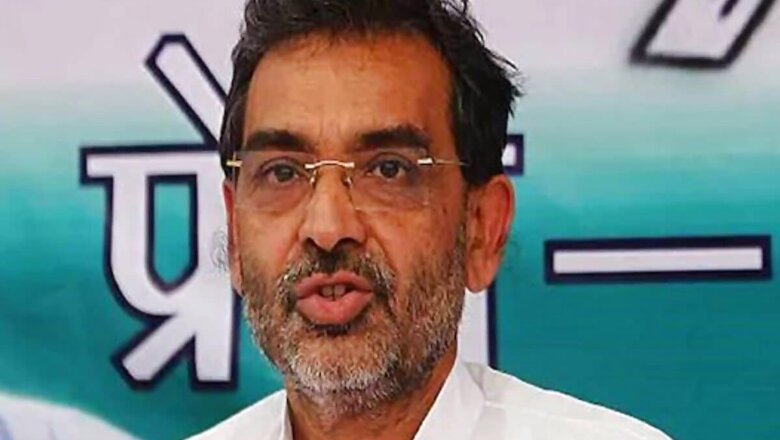
views
The Rashtriya Lok Samata Party (RLSP) president and former union minister Upendra Kushwaha is an ambitious politician eager to climb to the top post in Bihar but he is so desperate to achieve his goal that his decisions often land him in a mess with little space in the political setup of the otherwise electorally complex state.
Kushwaha has been caught in the quagmire of his own political gaffes to the extent that he is fast turning out to be the persona non grata of Bihar politics. Having been shown the doors in the Grand Alliance or Mahagathbandhan led by the Rashtriya Janata Dal (RJD) just before the upcoming state assembly elections, Kushwaha is now looking for a political platform with a favourable social equation to sail through the state assembly polls in Bihar.
It is learnt that he is desperate to join the National Democratic Alliance (NDA) or to form a third front in alliance with the likes of Jan Adhikar Morcha (JAP) chief Rajesh Ranjan alias Pappu Yadav. Some other splinter groups may also join the bandwagon if a Third Front is formed.
But there are many stumbling blocks for Kushwaha in joining the NDA. First, his bête noire and Bihar chief minister Nitish Kumar will not allow him to join the NDA given the antagonism they nourish against each other. Second, the number of seats Kushwaha has been demanding in the Grand Alliance may not be possible in the NDA because a tug of war is already on among the Bharatiya Janata Party (BJP), Janata Dal (U) and the Lok Janshakti Party (LJP) over seats.
In fact, the political stock of Kushwaha has been diluted over the years because of his flip-flops and poor electoral performances in the last assembly and Lok Sabha elections. His shallow perception of political realities of Bihar has cost him dearly and come as a roadblock to his high political ambitions.
Kushwaha stepped into politics in 1985 and became the state general secretary of the Yuva Lok Dal. He joined the Samata Party floated by George Fernandes and Nitish Kumar and became its general secretary. He was elected to the state assembly in 2000 and became the leader of opposition in a swift turn of events with the election of BJP leader Sushil Kumar Modi to Lok Sabha.
Nitish was then mentor of Kushwaha and was instrumental in making him the leader of opposition in Bihar assembly in 2004 even though Kushwaha was then the first-time legislator.
However, Kushwaha started raising the issue of marginalisation of Koeri (Kushwaha) caste among the different social justice groups in the share of power. He was eventually dismissed from the Janata Dal (U) in 2007. He floated the Rashtriya Samata Party (RSP) in February 2009 with the support of the then deputy Chief Minister of Maharashtra Chhagan Bhujbal. Only nine months later, Kushwaha’s RSP merged into the Janata Dal (U) again in November 2009 following mending of his ties with Nitish Kumar.
He soon became disenchanted with the style of functioning of Nitish Kumar alleging that the governance has taken a beating in Bihar. He alleged that Nitish ran his government through autocratic means and that he had turned the Janata Dal (U) as his pocket borough. In due course, Kushwaha, who at that time was a Rajya Sabha member, again resigned from the Janata Dal (U).
Kushwaha floated the RLSP in 2013 and joined the NDA because Nitish Kumar had by then quit and allied with the Grand Alliance led by RJD led by Lalu Prasad.
In the 2014 Lok Sabha elections, the RLSP won all the three seats it contested – Karakat, Jehanabad and Sitamarhi. Kushwaha was elected from Karakat seat and made minister of state in the Narendra Modi government. In the subsequent state assembly elections in 2015, Kushwaha’s party was part of theNDA and it contested 23 out of 243 assembly seats in Bihar. However, it won only two seats.
When Nitish Kumar quit the Grand Alliance and re-joined the NDA in 2017, Kushwaha started sulking and showing his reluctance by censuring the Nitish Kumar government on alleged mismanagement in the field of education and deteriorating law and order situation.
Before the 2019 Lok Sabha elections, Kushwaha pitched for more than three Lok Sabha seats for his party to remain in the NDA. As his colleague and Jehanabad MP Arun Kumar had quit the party, Kushwaha was offered the existing two seats – Karakat and Sitamarhi. But Kushwaha wanted one more – Valmikinagar – held by BJP’s Satish Chandra Dubey.
Eventually, he switched over to the Grand Alliance and contested the 2019 Lok Sabha elections on five parliamentary seats. Kushwaha himself contested from two seats – Karakat and Ujiyarpur. But he lost from both the seats and his party too failed to win even a single seat.
After drawing a blank in the 2019 Lok Sabha polls, the RLSP received another setback as its two MLAs – Lalan Paswan and Sudhanshu Shekhar – and lone MLC Sanjiv Singh Shyam joined the Janata Dal (U). The legislators had revolted against Kushwaha’s decision to snap ties with the NDA and join the Mahagathbandhan.
After his win in 2014 Lok Sabha polls, Kushwaha was visualised as ‘an emerging leader of the Koeri caste’ with the capacity to transfer the votes of his community to the party or combination of his choice. He tried to drive a wedge in the famous Luv-Kush (Kurmi-Koeri) combination and worked for Koeri resurgence with a goal to assume political and administrative power.
He nourishes a secret wish of becoming the chief minister of Bihar. Kushwaha has been unequivocally declaring that it was now the turn of Koeris to rule in Bihar after the 15-year rule of Yadavas led by Lalu Prasad and subsequent 15-year rule of Kurmis led by Nitish Kumar.
Though he nurtures high political ambitions, he lacks the political consistency and dedication required to become leader of a particular caste group and an acceptable leader among other caste groups and communities.
He seems to have lost his charm before emerging on the political horizon of Bihar due largely to his frequent switchovers and inept handling of the political situation. He nourishes a far bigger ambition than his acceptability among the masses.
Kushwaha has also tried to unite the Yadavas and Koeris with his Kheer theory saying that a delicious Kheer (a dessert made of milk and rice) is possible only when the milk comes from the Yadavas and the rice from the Koeris. While the Yadavas constitute nearly 12 per cent of the total population, the Koeris account for 6 per cent of the total electorate in Bihar. But his Kheer theory has not yielded any result as he has been mistreated in the Grand Alliance.















Comments
0 comment